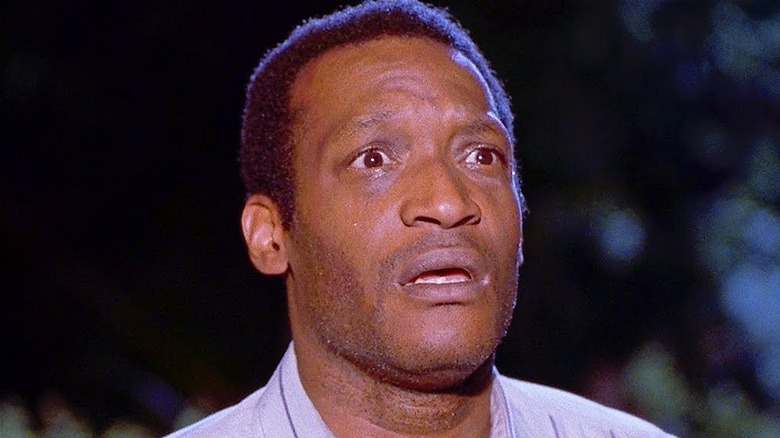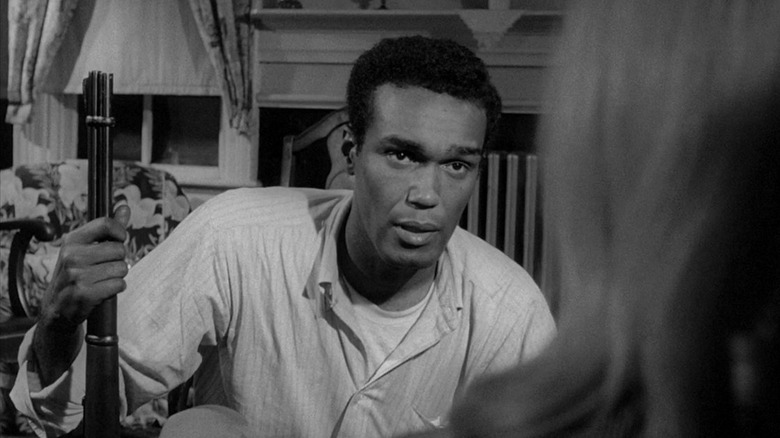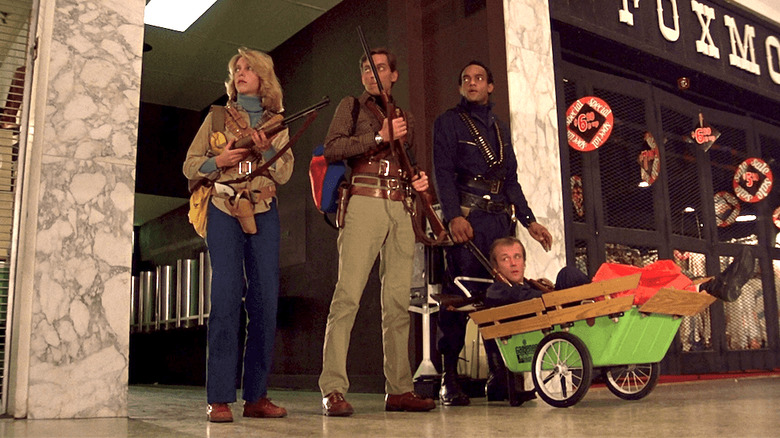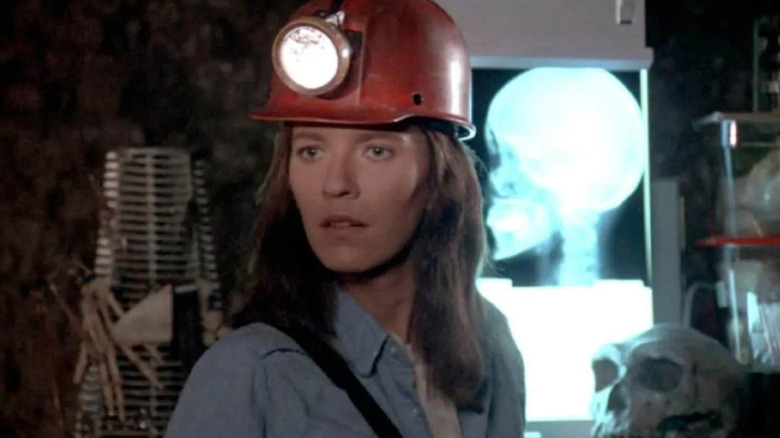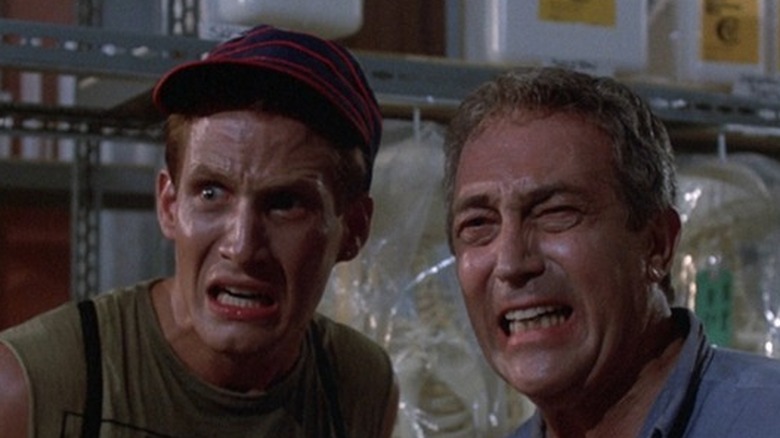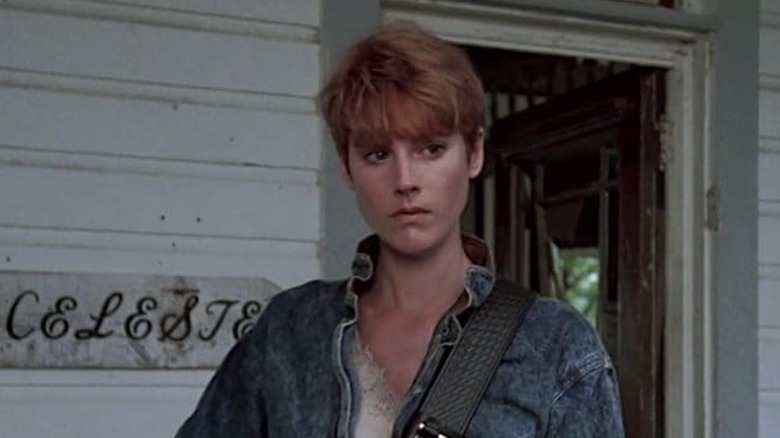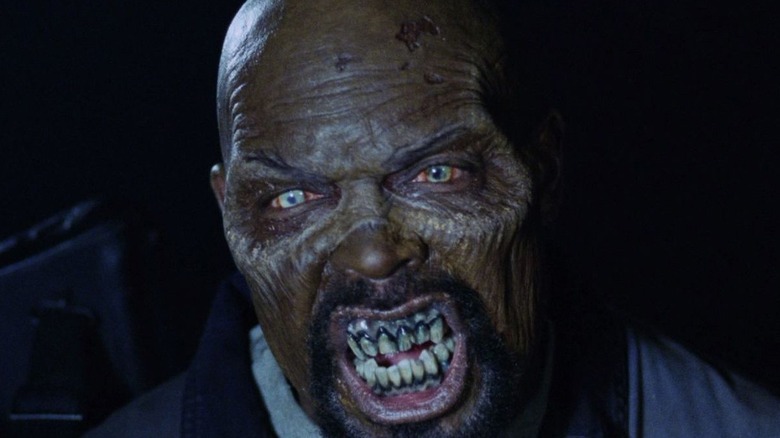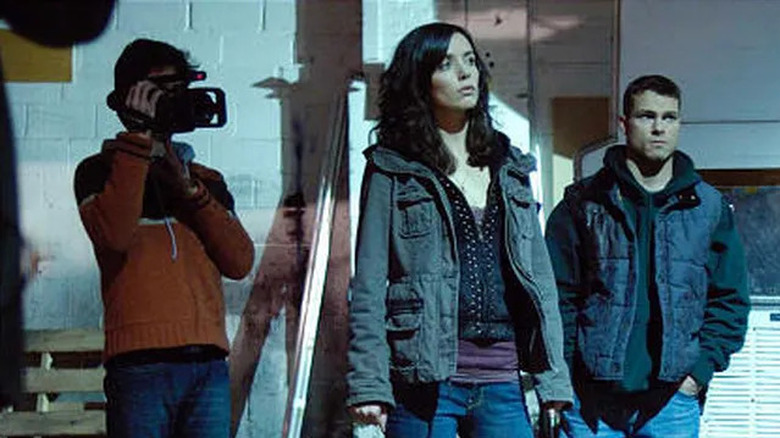The Correct Order In Which To Watch The Night Of The Living Dead Franchise
You'd be hard-pressed to find a zombie fan unfamiliar with George A. Romero's expansive "Night of the Living Dead" franchise, which is widely regarded to have set the stage for almost all current zombie media and redefined the horror genre. However, due to a copyright mishap that inundated the world with both official and unofficial spin-offs and sequels (via The Verge), it's pretty easy to get lost in this sea of undead flesh-eater films.
But for any "Living Dead" beginner, the key to watching the franchise in the correct order is actually quite simple. Watch in the order the films were released (which, narratively, also happens to be in mostly chronological order); stick close to the core films as they trace the gradual progression of a zombie apocalypse and the terrible impact it has on various groups of human survivors; and keep in mind that each Romero film is very much a product of its time, often commenting on the social issues of its decade.
Night of the Living Dead (1968)
It only makes sense to induct any "Living Dead" newbie into the franchise with the O.G. "Night of the Living Dead." Romero released this low-budget, black-and-white cult classic in the height of the civil rights era, focusing on the events of an initial zombie outbreak and offering some heavy-hitting racial commentary (via The Boston Globe).
After her brother, Johnny, is attacked by a zombie while they're laying flowers on their father's grave in the rural outskirts of Pittsburgh, PA, Barbra (Judith O'Dea) flees for her life, retreating to a nearby farmhouse. There, she eventually finds the protagonist, Ben (Duane Jones), a married duo fretting over their ailing daughter, and a scared young couple. The group tries to survive the night as impending zombie doom closes in on them. But they soon discover that the undead horde outside isn't their biggest problem — it's each other.
Set in the late 1960s, "Night" examines the violent race relations and prejudice of the time in an incredibly visceral way through our Black lead and his interactions with other characters, particularly the coldly stubborn patriarch, Harry Cooper (Karl Hardman). With creative practical effects and props, some disturbing imagery, and a devastating conclusion, "Night" traces the very beginnings of a zombie outbreak in riveting fashion. And while it isn't the first zombie movie ever made, it does serve as the basic model according to which all modern-day zombies are designed.
Dawn of the Dead (1978)
"Dawn of the Dead" is the sequel to "Night" Romero imagined. With financial assistance from Italian horror director Dario Argento in exchange for international distribution rights (via CinemaBlend), Romero enjoyed a bigger budget as he explored the ways a mall could serve as an effective hideaway in the event of a disaster. Three weeks after the initial outbreak, we move from a group of survivors holed up in a lone farmhouse to a group of survivors seeking refuge in a mall. Pittsburgh residents are holding on by a thread as social order collapses amid zombie chaos. Soon, a traffic reporter hops into a helicopter with his producer girlfriend and two SWAT team officers. They flee from the carnage, landing on the roof of the Monroeville Mall. There, they enjoy all the mall's amenities — until hordes of zombies come knocking.
This "Living Dead" film critiques '70s consumer culture (which is just as relevant in the capitalist USA of today). The commentary on consumerism has become a common trope with zombie movies, as seen in other films like "The Dead Don't Die" and "Zombieland." You'll also notice that the zombies have changed slightly. While they're still relatively thoughtless, they do start bumbling toward places they frequented in life (like shopping malls). Not only that, some of the zombies start demonstrating a bit of muscle memory by picking up and trying to handle potential weapons. And while they rarely use these weapons effectively, they're clearly starting to remember something from their human lives.
Day of the Dead (1985)
The end of "Dawn of the Dead" leads us pretty perfectly into "Day of the Dead." Very much an '80s film, "Day" follows a group of scientists and military personnel living and working in barricaded underground bunkers while they study zombie evolution. We are now in the midst of a full-blown zombie apocalypse where most of the world has recently been ravaged by the undead.
The cohabitation between the scientists and the military, however, is anything but pleasant. The soldiers are tasked with protecting this group of researchers as they try to find a way to reverse the living dead pandemic, but these two groups have very different agendas when it comes to their zombie enemies. While the scientists study the captured undead in the hopes of understanding this grotesque phenomenon and potentially rehabilitating the lost souls, the army angles to weaponize the flesh-eating monsters. With significant Cold War undertones, Romero once again proves the reckless whims of humans are more terrifying than slow-moving zombies.
It's also in this movie that we start to see real zombie evolution. Dr. Matthew "Frankenstein" Logan (Richard Liberty) is convinced that captive zombie "Bub" (Sherman Howard) harbors some memory of his past life, and the zombie seems capable of engaging in rudimentary human behavior, like saluting an officer. The zombies in "Day" are officially becoming something more than thoughtless, undead flesh-eaters.
Return of the Living Dead (1985)
George Romero and John Russo split after making the O.G. "Night of the Living Dead." Romero shifted his focus to "Dawn," and Russo partnered with director Dan O'Bannon to create "The Return of the Living Dead," based on his own novel of the same name. While not an "official" installment of the franchise, it is Russo's sequel to "Night," and many fans view it as an important part of the "Living Dead" legacy.
The story begins with foreman Frank (James Karen) trying to appear cool and impressive to a new hire, Freddy (Thom Mathews), by showing him the military drums in the basement of the medical supply warehouse where they work. (Of course, this doesn't end well.) In this film, O'Bannon and Russo imagine a world in which the events of "Night of the Living Dead" actually happened, and humanity lives in fear of a resurgence. Add in a colorful band of punks, and you have an unofficial but absurdly entertaining follow-up to "Night."
While Romero's films critique social issues, Russo's "Return" is a fun horror-comedy romp that offers a release valve. Things are still dire, of course, but it's meant to be horrifically funny, providing some much-appreciated comic relief. Notably, this movie is where the common zombie trope of craving brains comes from. Plus, Linnea Quigley got her start as a scream queen here, and her graveyard dance is an iconic must-see for any prospective "Living Dead" fan!
Night of the Living Dead (1990)
Award-winning horror makeup artist Tom Savini directed the official remake of "Night of the Living Dead," which transforms the character of Barbara (now with an extra "a") into a badass '90s-era feminist, giving her the agency that her original counterpart lacks. It's worth noting that Barbara's new arc does, unfortunately, come at the cost of Ben's, as well as the racial critique that makes the original such a stunningly somber story. Still, the feminist reimagining of a group of survivors attempting to survive one terrifying night in a boarded-up farmhouse, with zombies slowly closing in and distinct distrust simmering between each other, was embraced by audiences of the time. It certainly doesn't hurt that special effects have significantly improved over the decades, or that Tony Todd and Patricia Tallman are fantastic in their roles as Ben and Barbara.
However, according to Tom Savini, who butted heads with the producers, the final product is not what he had envisioned. We have to say, we're more than a little curious about what Savini would have done with this remake if he'd had the creative control he wanted. Nonetheless, watching the remake of "Night" after "Return of the Living Dead" is a great way to reorient yourself within the franchise's core, overarching storyline before moving on to "Land of the Dead."
Land of the Dead (2005)
The characters in "Land of the Dead" have learned to live in a post-zombie apocalypse world. The surviving residents of Pittsburgh have sought safe haven downtown, using the three surrounding rivers to separate themselves from the world and locking down the city's bridges. However, in this new world, they also suffer under a harsh, feudal-like government.
It's also in this film that we see the disturbing progression of zombie evolution start to peak as a zombie leader called "Big Daddy" (Eugene Clark) begins to rally his undead troops. This bleak universe is not unlike the ones seen in other zombie media like "The Walking Dead," "28 Weeks Later," and to some extent, "Resident Evil."
Released in mid-2005, this film came on the heels of some unique anxieties, from the turn of the century that some thought would mark the end of the world to the 9/11 terrorist attacks that instilled mass fear and anger in the general public. In the context of such tension, the living dead are even more threatening because, in this film, they're becoming more human. They're remembering more and learning how to use weapons. Add that to their craving for human flesh, and you have the recipe for a nasty monster capable of making some particularly creative decisions while learning how to use their undead status to their advantage.
Diary of the Dead (2007) & Survival of the Dead (2009)
You'll notice we left out two notable installments: "Diary of the Dead" and "Survival of the Dead." In the chronology of the zombie apocalypse, from the initial outbreak to a post-apocalyptic world, "Diary" — released two years after "Land" — would technically come before the O.G. "Night." But here's the thing: We would never tell anyone to start with "Diary," because we would never tell anyone to watch anything other than the 1968 version of "Night" first. With "Diary," Romero offers up a found-footage film that follows university students who are thrust into a zombie apocalypse while making a horror film. Not a bad watch, but not a worthy initiation, either.
"Survival," which came two years after "Diary," is even more polarizing, with some "Living Dead" fans viewing it as a stain on Romero's legacy and others loving it. When Reddit user u/AlrightUsername asked in what order they should watch the "Living Dead" films, several folks responded telling them to avoid "Survival." Still, this film is the last "Living Dead" film helmed by Romero himself. And with continued chatter around the posthumous release of Romero's "Twilight of the Dead," many fans see "Survival" as an important chapter.
The gist is this: Both of these films are worth viewing for budding, enthusiastic fans, but we'd suggest watching them after the first six we've suggested, even though it means backtracking in the overarching zombie narrative. Then, if you're really enjoying the franchise and are interested in more, you can draw your own conclusions about these two!
